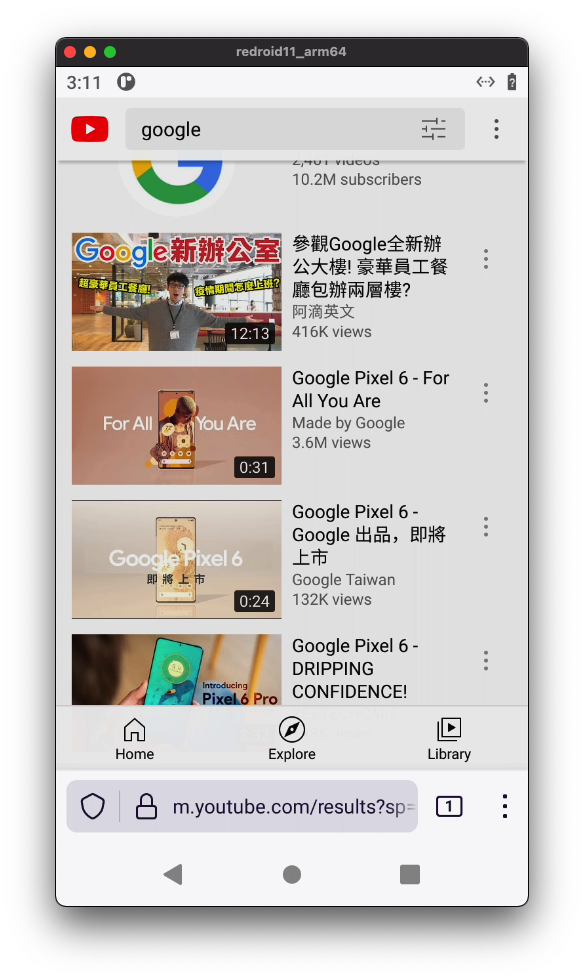English | 简体中文
- Overview
- Getting Started
- Configuration
- Native Bridge Support
- GMS Support
- WebRTC Streaming
- How To Build
- Troubleshooting
- Note
- Contact Me
- License
ReDroid (Remote anDroid) is a GPU accelerated AIC (Android In Cloud) solution. You can boot many
instances in Linux host (Docker, podman, k8s etc.). redroid supports both arm64 and amd64 architectures.
ReDroid is suitable for Cloud Gaming, Virtualise Phones, Automation Test and more.
Currently supported:
- Android 13 Preview (
redroid/redroid:13.0.0-latest,redroid/redroid:13.0.0-amd64,redroid/redroid:13.0.0-arm64) - Android 12 (
redroid/redroid:12.0.0-latest,redroid/redroid:12.0.0-amd64,redroid/redroid:12.0.0-arm64) - Android 12 64bit only (
redroid/redroid:12.0.0_64only-latest,redroid/redroid:12.0.0_64only-amd64,redroid/redroid:12.0.0_64only-arm64) - Android 11 (
redroid/redroid:11.0.0-latest,redroid/redroid:11.0.0-amd64,redroid/redroid:11.0.0-arm64) - Android 10 (
redroid/redroid:10.0.0-latest,redroid/redroid:10.0.0-amd64,redroid/redroid:10.0.0-arm64) - Android 9 (
redroid/redroid:9.0.0-latest,redroid/redroid:9.0.0-amd64,redroid/redroid:9.0.0-arm64) - Android 8.1 (
redroid/redroid:8.1.0-latest,redroid/redroid:8.1.0-amd64,redroid/redroid:8.1.0-arm64)
redroid should capabale running on any linux (with some kernel features enabled).
Quick start on Ubuntu 20.04 here; Check deploy section for other distros.
## install docker https://docs.docker.com/engine/install/#server
## install required kernel modules
apt install linux-modules-extra-`uname -r`
modprobe binder_linux devices="binder,hwbinder,vndbinder"
modprobe ashmem_linux
## running redroid
docker run -itd --rm --privileged \
--pull always \
-v ~/data:/data \
-p 5555:5555 \
redroid/redroid:11.0.0-latest
### Explanation:
### --pull always -- use latest image
### -v ~/data:/data -- mount data partition
### -p 5555:5555 -- expose adb port
## install adb https://developer.android.com/studio#downloads
adb connect localhost:5555
### NOTE: change localhost to IP if running redroid remotely
## view redroid screen
## install scrcpy https://github.com/Genymobile/scrcpy/blob/master/README.md#get-the-app
scrcpy -s localhost:5555
### NOTE: change localhost to IP if running redroid remotely
### typically running scrcpy on your local PC## running redroid with custom settings (custom display for example)
docker run -itd --rm --privileged \
--pull always \
-v ~/data:/data \
-p 5555:5555 \
redroid/redroid:11.0.0-latest \
redroid.width=1080 \
redroid.height=1920 \
androidboot.redroid_dpi=480 \
| Param | Description | Default |
|---|---|---|
qemu |
export param with the "ro.kernel." prefix NOT QEMU-KVM related |
1 |
androidboot.hardware |
specify ro.boot.hardware prop |
redroid |
redroid.width |
display width | 720 |
redroid.height |
display height | 1280 |
redroid.fps |
display FPS | 30(GPU enabled) 15 (GPU not enabled) |
androidboot.redroid_dpi |
display DPI | 320 |
androidboot.use_memfd |
use memfd to replace deprecated ashmemplan to enable by default |
false |
androidboot.use_redroid_overlayfs |
use overlayfs to share data partition/data-base: shared data partition/data-diff: private data |
0 |
net.eth0.dns1 |
DNS | 8.8.8.8 |
net.eth0.proxy.type |
Proxy type; choose from: static, pac, none, unassigned |
|
net.eth0.proxy.host |
||
net.eth0.proxy.port |
||
redroid.gpu.mode |
choose from: auto, host, guest;guest: use software rendering;host: use GPU accelerated rendering;auto: auto detect |
auto |
redroid.gpu.node |
auto-detect | |
ro.xxx |
DEBUG purpose, allow override ro.xxx prop; For example, set ro.secure=0, then root adb shell provided by default |
Plan to migrate all params under
androidboot.namespace
It's possible to run arm Apps in x86 ReDroid instance via libhoudini, libndk_translator or QEMU translator.
Take libndk_translator as an example:
# grab libndk_translator libs from Android 11 Emulator
find /system \( -name 'libndk_translation*' -o -name '*arm*' -o -name 'ndk_translation*' \) | tar -cf native-bridge.tar -T -
# example structure, be careful the file owner and mode
system/
├── bin
│ ├── arm
│ └── arm64
├── etc
│ ├── binfmt_misc
│ └── init
├── lib
│ ├── arm
│ └── libnb.so
└── lib64
├── arm64
└── libnb.so# Dockerfile
FROM redroid/redroid:11.0.0-amd64
ADD native-bridge.tar /
COPY factory.prop /factory/factory.prop# factory.prop
ro.product.cpu.abilist=x86_64,arm64-v8a,x86,armeabi-v7a,armeabi
ro.product.cpu.abilist64=x86_64,arm64-v8a
ro.product.cpu.abilist32=x86,armeabi-v7a,armeabi
ro.dalvik.vm.isa.arm=x86
ro.dalvik.vm.isa.arm64=x86_64
ro.enable.native.bridge.exec=1
ro.dalvik.vm.native.bridge=libndk_translation.so
ro.ndk_translation.version=0.2.2
# build docker image
docker build . -t redroid:11.0.0-amd64-nbTake a look at https://gitlab.com/android-generic/android_vendor_google_emu-x86 to extract automatically libndk_translator from the Android 11 emulator images.
After following the guide on "Building" section, you will get native-bridge.tar under vendor/google/emu-x86/proprietary.
If you find errors in using libndk_translator, please try the following:
-
YOU MUST HAVE binfmt_misc kernel module loaded for supporting other binaries formats! If you have not loaded it already:
sudo modprobe binfmt_misc
or add binfmt_misc to /etc/modules to autoload it at boot (for example in Ubuntu).
Check your specific distribution wiki/docs if you don't have binfmt_misc module and you want to install it, or how to autoload the module at boot.
-
Extract the native bridge archive, preserving the permissions, set specific permissions for allowing init file to be executed and traverse of important dirs:
mkdir native-bridge cd native-bridge sudo tar -xpf ../native-bridge.tar `#or path to your actual native bridge tarball` sudo chmod 0644 system/etc/init/ndk_translation_arm64.rc sudo chmod 0755 system/bin/arm sudo chmod 0755 system/bin/arm64 sudo chmod 0755 system/lib/arm sudo chmod 0755 system/lib64/arm64 sudo chmod 0644 system/etc/binfmt_misc/* sudo tar -cpf native-bridge.tar system
Move or copy your new native-bridge.tar into the dir where you have written your Dockerfile, and rebuild again the new image with native bridge support.
You must use sudo or a root shell to preserve the permissions and owners of the files.
It's possible to add GMS (Google Mobile Service) support in ReDroid via Open GApps, MicroG or MindTheGapps.
Check android-builder-docker for details.
CALL FOR HELP
Plan to port WebRTC solutions from cuttlefish, including frontend (HTML5), backend and many virtual HALs.
It's Same as AOSP building process. But I suggest to use docker to build.
Check android-builder-docker for details.
- Container disappeared immediately
make sure the required kernel modules are installed; run
dmesg -Tfor detailed logs
- Container running, but adb cannot connect (device offline etc.)
run
docker exec -it <container> sh, then checkps -Aandlogcattry
dmesg -Tif cannot get a container shell
redroidrequirepid_maxless than 65535, or else may run into problems. Change in host OS, or addpid_maxseparation support in PID namespace- SElinux is disabled in ReDroid;
- CGroups errors ignored; some (
stunefor example) not supported in generic linux. procfsnot fully seperated with host OS; Community uselxcfsand some cloud vendor (TencentOS) enhanced in their own kernel.vintfverify disabled
- [email protected]
- remote-android.slack.com (invite link: https://join.slack.com/t/remote-android/shared_invite/zt-q40byk2o-YHUgWXmNIUC1nweQj0L9gA)
ReDroid itself is under Apache License, since ReDroid includes many 3rd party modules, you may need to examine license carefully.
ReDroid kernel modules are under GPL v2
